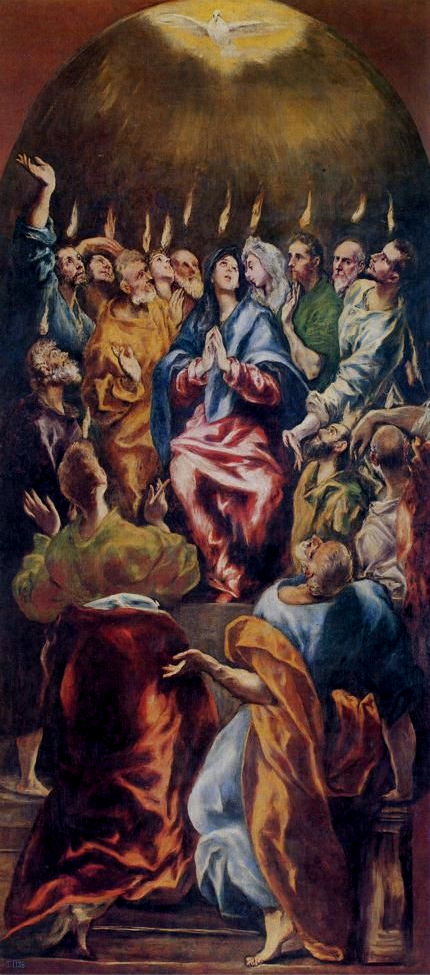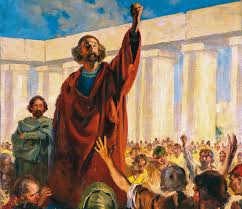
– 28- 5 – 2023 –
-Pentecost Sunday-
Gospel Text : John 20:19-23
vs.19 In the evening of that same day, the first day of the week, the doors were closed in the room where the disciples were, for fear of the Jews. Jesus came and stood among them. He said to them, “Peace be with you,”
vs.20 and showed them his hands and his side. The disciples were filled with joy when they saw the Lord,
vs.21 and he said to them again, “Peace be with you.
As the Father sent me, so am I sending you.”
vs.22 After saying this he breathed on them and said,
“Receive the Holy Spirit.
vs.23 For those whose sins you forgive, they are forgiven; for those whose sins you retain, they are retained.”
******************************************
We have four sets of homily notes to choose from. Please scroll down the page for the desired one.
Michel DeVerteuil : A Holy Ghost priest and Specialist in Lectio Divina
Thomas O’Loughlin: Professor of Historical Theology, University of Nottingham.
John Littleton: Director of the Priory Institute Distant Learning, Tallaght 24.
Donal Neary SJ: Editor of The Sacred Heart Messenger
*******************************************************
Michel de Verteuil
Lectio Divina with the Sunday Gospels – Year A
www.columba.ie
General comments
The Mass of Pentecost has two accounts of the sending of the Holy Spirit, one from the Acts and one from St John’s Gospel. Don’t combine the two accounts in your meditation. Each in its own way is true, in the sense that it helps us recognise moments when God sent his Spirit into us, as individuals or as a community. Sometimes it happens in extraordinary ways, and at other times it happens in quite ordinary ways. I am inviting you to meditate on the gospel account. It is less spectacular than the one in the Acts, but no less true.
– In verse 19 imagine well how the disciples felt as they gathered in the room on that Easter Sunday evening; you will feel then the drama of Jesus’ entry. Read it as a sending of the Spirit.
– In order to interpret verse 20 let your memories explain for you the meaning of Jesus’ showing his hands and his side.
– Verse 21 has very little for the imagination, so you must make an effort to enter into it. It speaks of two sendings:
– Jesus sent by the Father, which we know from the New Testament
;- we are sent by Jesus, which we know from experience.
Let the two shed light on each other.
– Read verse 22 by itself, entering into the symbolism of Jesus’ breathing on the disciples.
– Verse 23 in our Church tradition evokes memories of the sacrament of reconciliation. You might like to remember other times when we have forgiven or retained one another’s sins.
Prayer Reflection
Lord, we celebrate today our personal Pentecosts:
we were going through a difficult time –
* a relationship had broken down;
* a movement we had given ourselves to disintegrated because of internal conflicts;
* our prayer life was totally dry.
We turned in on ourselves, afraid to meet others lest we had to relate with them.
afraid to meet others lest we had to relate with them.
Then quite suddenly something happened:
– friends came and shared their journey with us;
– we went on a retreat and had a deep sense of being loved;
– we were invited to join a group who shared our values.
It was as if Jesus had come through the closed doors of the room we were in, stood with us and said,
“Peace be with you.”
“The moment we cease to hold each other, the moment we break faith with one another, the sea engulfs us and the light goes out.”….James Baldwin
Lord, humanity today is deeply divided.
Groups of people have cut themselves off, afraid to mix with others lest they lose their identity.
Send us people like Jesus who will pass through the locked doors, stand among others, share their own humanity, and say “Peace be with you.“
“Why can’t Christians see the poor wounded part inside themselves? Can they not see Jesus there?”…..Carl Jung
Lord, we spend so much energy denying our hurts, hiding the marks of the nails in our hands and the deep wounds in our sides.
Give us the grace to look with compassion at the truth of ourselves, like the disciples letting Jesus show them his hands and his side, so that we may be at peace.
“It is not as if we had a high priest who was incapable of feeling our weaknesses with us; but we have one who has been tempted in every way that we are, though he is without sin.” ….Hebrews 4:15
Lord, you sent your Son Jesus as one of us.
He shared the weaknesses of the human condition, he knew uncertainty and anxiety about the future, he was limited to living in one culture and in one period of history.
Help us, Lord, to accept that as you sent Jesus so he sent us.
Lord, the modern world knows many ways of influencing others:
+ advertising;
+the power of weapons;
+aggressive argumentation which forces others to agree.
Forgive us, Lord, that we followers of Jesus use these methods in preaching his message.
Teach us to trust in his power – love, gentle as breath, the kind that leaves others free and creative, and comes from the very depths of our selves.
One day St Catherine of Siena had a strange experience: Jesus came to her and removed her physical heart saying: “I am giving you my heart so that you can go on living with it forever.”
Lord, lead us to deep union with your Son Jesus,
let him breathe into us, so that when we breathe
he is breathing in us, and when we love, he is loving in us.
Lord, we remember with gratitude the times when a priest of the Church forgave our sins and we knew that they were forgiven.
Lord, we remember parts of the world that were/are torn by civil strife – the Middle East, Northern Ireland, Sudan, The Ukraine, Chinese Christians
So many sins of the past are being retained because they are retaining them. We pray that they may forgive one another and so their sins may be truly forgiven.
*******************************
Thomas O’Loughlin
Liturgical Resources for the Year of Matthew
www.columba.ie
Introduction: Vigil Mass
Today, most unusually, the Missal supplies a ‘Mass for the Vigil’ of the feast, and a ‘Mass for the Day‘ of the feast, each with its own readings and prayers. This vigil Mass is understood as the vigil in preparation for the day, and so it assumes that those who take part in it, will also take part in the Mass during the day, ‘when the day of Pentecost [has] come’ (Acts 2:1). However, in most communities where there is a Saturday evening ‘vigil Mass/ this is not understood as the beginning of a real vigil which would end on the day with another celebration, but it is the Sunday’s Mass anticipated for the convenience of the assembly- Hence, those people who participate in the Saturday evening Mass in lieu of a celebration on Sunday morning will not hear the basic Pentecost readings nor experience the basic liturgy of this feast, if the Mass of the vigil is used on Saturday evening. Since that Saturday is really just ‘Sunday early,’ it is best to use the Mass of the day and its readings on Saturday evening — and leave the formal Mass of the vigil for those occasions when a real vigil (the Eucharist followed by the Liturgy of the Hours and concluding on the day) is being celebrated.
Introduction: Day’s Mass
Today we are celebrating a feast that was celebrated by many of the Jews who lived at the time of Jesus. Many of his early followers continued to celebrate it after the resurrection, and so it became part of the annual celebrations of all Christians. However, over the first few decades of the church, this feast took on a new meaning: Jesus has risen and ascended to the Father, but he promised us his Spirit. So today we rejoice that the Spirit is moving in each of our hearts making us a people, inspiring us to understand the mystery of our faith, and strengthening us to follow Jesus the Anointed One.
Homily Notes
The focus of Pentecost for Christians is as a celebration of, and a thanksgiving for, the presence and focus of the Spirit in our lives as Christians. The Spirit is the one who brings unity – unity with one another and with Christ, and so the church is ‘his’ work. Today is a thanksgiving for this gift, member- ship of the church, which we profess in the recitation of the Creed: ‘we believe in one holy catholic and apostolic church’. Significantly, it is this gift of belonging to the People that made Christianity so attractive in the early centuries of its life where the emphasis was not on a set of peculiar doctrines which were shared by a group (e.g. the eastern mystery cults), but on belonging to a new community which had doctrines peculiar to it.
We see this concern with belonging to the church in one of the simplest creeds that has survived from that time: ‘I believe in God, the almighty Father and in his only-begotten Son, Jesus Christ, and in the Holy Spirit and in the resurrection of the flesh in the holy catholic church,’ Belonging to this universal (i.e. catholic) group that cut across social, ethnic, linguistic, and political boundaries was central to their self-understanding and was the ongoing work of the Spirit.
I f Luke wants us to use a festival fifty days after our Passover to recall the fundamental belief that the presence of God, the Spirit, dwells within and activates the church how does he imagine that presence? It is with this question we should look at his carefully crafted story in Acts 2. The Spirit is the one who gathers us – all the different ‘nations’ are brought into contact with one another. Then the Spirit unites them into one church gathered around Jesus – so the followers of Jesus everywhere are linked through the apostles. The Spirit then inspires them and sends them forth to be the witnesses to Jesus to the ends of the earth. As Luke writes he has in mind the many individual churches where his work will be read and wants to ensure that each individual church recognises itself as a node in a great web that stretches not only across the empire (the oikumene) – ‘visitors from Rome’ – but even beyond its borders (Parthians and Medes) and so is universal.
f Luke wants us to use a festival fifty days after our Passover to recall the fundamental belief that the presence of God, the Spirit, dwells within and activates the church how does he imagine that presence? It is with this question we should look at his carefully crafted story in Acts 2. The Spirit is the one who gathers us – all the different ‘nations’ are brought into contact with one another. Then the Spirit unites them into one church gathered around Jesus – so the followers of Jesus everywhere are linked through the apostles. The Spirit then inspires them and sends them forth to be the witnesses to Jesus to the ends of the earth. As Luke writes he has in mind the many individual churches where his work will be read and wants to ensure that each individual church recognises itself as a node in a great web that stretches not only across the empire (the oikumene) – ‘visitors from Rome’ – but even beyond its borders (Parthians and Medes) and so is universal.
Christian Unity
We tend to think of ‘the church’ firstly as the worldwide institution and then of the local church as only ‘the local office’. Hence we have tremendous concern with making sure that everything is the same universally – just look at the old arguments for a single liturgy in Latin or the present arguments over translations. This attitude blinds us to much of Luke’s ecclesiology. He did not see unity as a unitary glut: but rather that the gospel could adapt itself to each nation – hence they did not hear the message in the lingua franca (in which he himself wrote) but in their own tongues. Unity between the churches is a gift of the Spirit, not a function of uniformity of practice. This reflected the real situation in which Luke wrote, where Christianity was already present (and this is pointed out in Acts) in, at least, four major linguistic areas; Greek (Asia and eastern Europe) and so Latin, Syriac (the spread of Christianity eastwards from Palestine), and the vernaculars of Egypt/the Nile valley. He assumed that they would each be different but would be bonded together not only by common rituals and books, but by a vision of themselves that was larger than their own Eucharistic group, region, nation, or any political boundary. While they would live and act locallyy. they would think globally, and so testify that the new covenant meant Christ through them was offering his risen life to every human.
*******************************************
John Litteton
Journeying through the Year of Matthew
www.Columba.ie
Gospel Reflection
Gospel reading (Vigil Mass): John 7:37-39 & (Mass during the Day): John 20:19-23
Jesus did not abandon his apostles, even when departing from this world to return to his Father in heaven. Ten days later, at Pentecost one of his most significant promises – the promise to send the Holy Spirit in abundance on them – was extraordinarily realised.
After Pentecost the apostles were never again the same. The outpouring of the Holy Spirit impacted dramatically on their convictions and on their enthusiasm to carry out Jesus’ wishes. The effects were immediately noticeable to the watching and listening crowds.
The apostles were filled with the Holy Spirit and given the gift of speech. As they spoke, their listeners – many of whom were foreigners – could hear and understand them in their own languages. The apostles now acted as members of a united and committed community. Although Christ had established the Church while still on earth, at Pentecost it became manifest in the world for the first time. It became obvious that God was working powerfully through the Church.
 At Pentecost the Church earnestly began its mission to the whole world. This mission centres on preaching about the saving name of Jesus and about the wonders of God. God’s greatest wonder is that, through the suffering and death of Jesus the Messiah, people are saved from the consequences of their sins: alienation from God.
At Pentecost the Church earnestly began its mission to the whole world. This mission centres on preaching about the saving name of Jesus and about the wonders of God. God’s greatest wonder is that, through the suffering and death of Jesus the Messiah, people are saved from the consequences of their sins: alienation from God.
Jesus’ fundamental promise to his apostles was that they would never be without his presence and his help. He knew that they would be unable to contribute successfully to the universal mission that he had given them unless he sent the Holy Spirit. The Holy Spirit would bring courage to his disciples, and restore unity and harmony between people. There is evidence of this in John’s Gospel when Jesus, after rising from the dead, said to his apostles: ‘Receive the Holy Spirit. For those whose sins you forgive, they are forgiven; for those whose sins you retain, they are retained’ (Jn 20:22-23).
Significantly, the outpouring of the Holy Spirit on the Church at its beginning corresponds to the earlier coming of the Holy Spirit on Jesus at the beginning of his public ministry when he was baptised in the River Jordan. In the same way that Jesus was always accompanied and guided by the Holy Spirit during his earthly life, so too is his Church as it brings repentant sinners to him. Repentance is necessary for salvation.
The feast of Pentecost celebrates a promise realised. It acknowledges that the Holy Spirit is at the heart of the Church’s life. Because that is so, the Church cannot ultimately fail in its task of witnessing to Jesus’ death and resurrection. It will eventually succeed in communicating the message of God’s salvation to everyone in the world.
The sacrament of confirmation, which celebrates the outpouring of the Holy Spirit in our lives and is the sealing of the graces, given in baptism, is our personal Pentecost experience when we are transformed into witnesses to the teaching and example of Jesus and his Church. We willingly take on the responsibility to share our Catholic faith with others.
The Feast of Pentecost is a wonderful celebration of the missionary Church. Let us reflect on our missionary efforts in our homes, schools and workplaces. How are we willing to demonstrate that we are serious about our confirmation (Pentecost) responsibilities? In what ways do we explain the authentic teaching of the Church? How do we experience Pentecost as a promise realised in our lives, leading us to make the urgency of the gospel message of salvation a reality for everyone we meet?
For meditation
As the Father sent me, so am I sending you. (Jn 20:21)
********************************************
Fr Donal Neary, S.J
Gospel Reflections for the Year of Matthew
www.messenger.ie/bookshop/
Spirit Alive
Someone dies and we say he kept his spirit alive to the end; or we say that ‘his spirit lives on’. A word we talk of easily. It’s something elusive, you can’t pin it down. It comes from somewhere. Maybe from parents, a spirit of endurance or being able to make it through tough time; or from our prayer and faith. We talk of good team spirit, or of a person who kept joyful and courageous to the end. Today is the feast of the Spirit of God, alive,
active and joyful.
 The flame of the Spirit of love is the flame of God. The tongues of fire over the apostles and the followers of Jesus were flames of love, the Spirit of God that would burn on the inside forever. Pentecost is the flame of God’s own love, given to his followers to mark the birth of the community, the body of Jesus, the church.
The flame of the Spirit of love is the flame of God. The tongues of fire over the apostles and the followers of Jesus were flames of love, the Spirit of God that would burn on the inside forever. Pentecost is the flame of God’s own love, given to his followers to mark the birth of the community, the body of Jesus, the church.
It is the spirit of forgiveness always, a gift of the first Pentecost. Did this blow in our own country during the visit of the British queen, when the Good Friday Agreement and other peace agreements were Signed, when the call came for a new reconciliation among people hurt badly in the times of the troubles?
Compassion, mercy, forgiveness and a hope for justice for all are gifts we ask from the Spirit who blows among us strongly today.
On each inbreath, pray
‘Come, Holy Spirit’,
live in me and in all of us
as you lived in Mary and the apostles.
********************************************